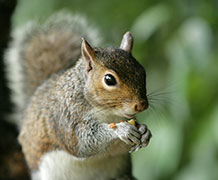
Squirrels had to work out which lever to pull or push to make the hazelnut drop to the floor so that they could eat it. Image courtesy of Shutterstock
New study gives squirrels plenty of food for thought
The age-old adage that ‘practice makes perfect’ has been found to illustrate how the humble grey squirrel solves problems in the search for food.
A new study by the University of Exeter has shown that persistence and the ability to choose the right behaviour to solve a problem are important aspects of problem solving in the common squirrel when they were learning to unravel challenges in the quest for nourishment.
Published in the leading scientific journal Animal Behaviour, the research tested the squirrels’ success with a specially designed box containing visible but out-of-reach hazelnuts in a controlled, indoor environment. Squirrels had to work out which lever to pull or push to make the hazelnut drop to the floor so that they could eat it.
The scientists found that increased experience, higher persistence and higher behavioural selectivity (the proportion of effective behaviours used) were directly related to increased efficiency in problem solving.
Crucially, the team also found that flexibility – or the rate that a squirrel switched between behavioural tactics – was not linked to learning how to get the food, and also increased the time spent on deciphering the puzzle.
Lead author of the study, Pizza Ka Yee Chow of the Centre for Research in Animal Behaviour at the University of Exeter, explained: “The results of the study are quite remarkable and give us the clearest indication yet as to the roles of flexibility, and persistence, in the problem solving process.
“The squirrels learnt to solve the puzzle quite quickly, and increase efficiency over the course of the study to free the nut to eat. Importantly, what we also showed is that flexibility, measured as the rate at which the squirrels changed behavioural tactics, may not always be advantageous for the animals.”
Co-author Dr Lisa Leaver of the University of Exeter added: “By identifying the mechanisms involved in solving problems, we hope to better understand why there is so much variation between individuals and between species in these abilities.”
'How practice makes perfect: the role of persistence, flexibility and learning in problem-solving efficiency’ by Pizza K. Y. Chow, Stephen E. G. Lea and Lisa A. Leaver is published in Animal Behaviour.
Date: 18 January 2016
